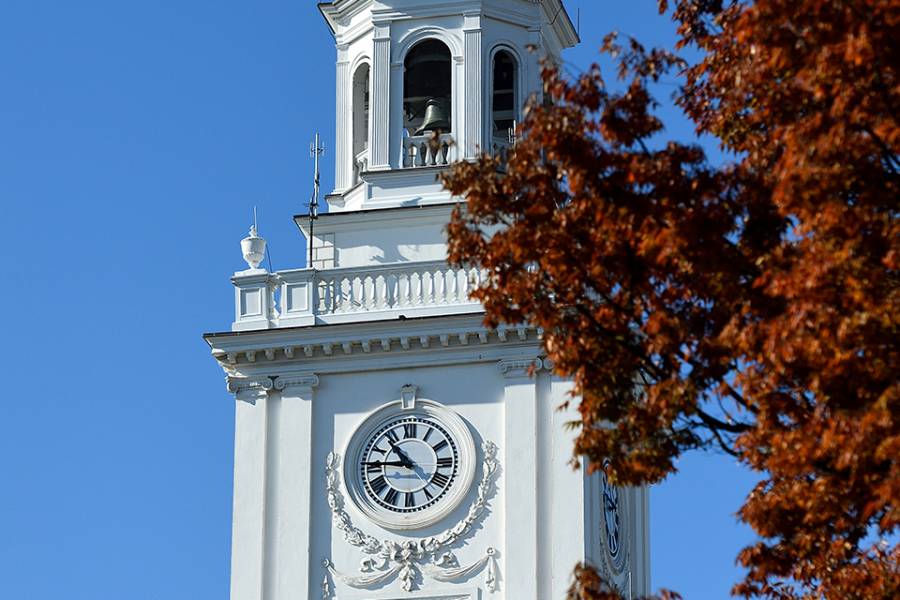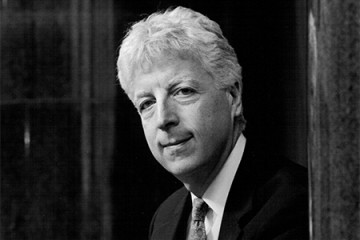Johns Hopkins University has released the findings of the university's second Commission on Undergraduate Education, a three-and-a-half-year exploration of the undergraduate experience, resulting in a series of six recommendations to improve the learning experience of undergrads for years to come.
The commission—or CUE2—produced an 88-page report outlining its concrete and aspirational recommendations for the two Homewood schools. The recommendations retain the strength and rigor of the major while enabling and encouraging disciplinary exploration outside of the major. To ensure breadth as well as depth, the report recommends that the current system of distribution requirements be replaced by a mechanism that helps students acquire a set of foundational abilities distributed over a 4-year arc of instruction. The core recommendations reflect a commitment to greater curricular flexibility with enhanced opportunities for learning outside of the classroom and in the community and world at large.
"We are truly proud that our undergraduates consistently represent one of the most talented and diverse student bodies in the nation," JHU President Ronald J. Daniels and Provost Sunil Kumar wrote in a message announcing the CUE2 findings today.
"The recommendations in this report are designed to build on the distinctive strengths of our students and world-class faculty and to ensure we remain bold and forward-thinking in how we view the defining characteristics of a Hopkins education."
Some of the most-impactful recommendations to the student experience include:
- A required first-year seminar
- The articulation of foundational abilities in six areas: language and writing; scientific, numerical and algorithmic reasoning; interpreting complex creative expression; citizenship in a diverse world; reflective ethical agency; and independent conceptualization of large-scale, consequential projects
- The streamlining of major requirements to allow for greater intellectual exploration
- Opportunities for a Hopkins Semester of intensive study during junior or senior year
- A new system for assessing the quality of instruction and mentoring
As the commission member tasked with implementation, Bertrand Garcia-Moreno is keenly aware of the challenges of transforming the core of the university's undergraduate experience.
"This is not a series of one-size-fits-all recommendations," Garcia-Moreno says. "These are recommendations, not mandates, and we will work with each department to figure out how they will strategically respond to the report, and help their students view their major in a broader context."
The deans of each school will be responsible for forming committees to guide the implementation of the recommendations at the school level. These committees will work with a standing, university-wide Undergraduate Education Board that will be established to review regularly the implementation of CUE2's recommendations. An undergraduate advisory group will also be organized to ensure a place for the student perspective in the implementation process.
Once adopted, the impacts of the CUE2 recommendations would be felt among students immediately upon their arrival to campus with the establishment of a required First Year Seminar for students on the Homewood campus. These seminars—deep and often multidisciplinary explorations of specific topics or issues—feature small class sizes designed to foster intellectual community around a topic the faculty member is passionate about as well as an opportunity for all first-year students to practice foundational reading, critical thinking, and communication skills.
Aliza Watters—who is working on CUE2 implementation, spearheading the new First Year Seminars, and offering a pilot seminar called "What is the Common Good?" this semester—says these seminars can be the perfect testing ground for the CUE2 recommendations. In the fall semester, Hopkins launched 13 pilot seminars to test their goals and scalability; 20 more will be offered in Spring 2021, taught by esteemed faculty from multiple KSAS departments, and divisions, including SAIS and Peabody.
"We heard over and over again that our students come in and take these enormous courses their first semester, and many don't have a small cohort experience providing faculty interaction and mentorship from the moment they set foot on campus," Watters says. "A First Year Seminar is something that can immediately pull students in when they arrive to create an onboarding, intellectually exciting experience, one that fosters camaraderie within each seminar and across the first-year class."
In "What is the Common Good?" students are asked "How do we define what is good for society as a whole?" while analyzing primary sources from literature, science, history, and art. Dianne Strauss is a first-year student planning to major in international studies and neuroscience. She said between remote learning and her major requirements, the seminar is the only opportunity she has to interact with students outside of her areas of study.
"It's the most diverse class I have, both in terms of majors and in terms of diversity in general," Strauss says. "The different perspectives, not only in terms of learned experience growing up but also from their outlook on the world, has shaped our conversations in a way that's fresh and exciting."
Classmate Zandy Wong said the first-year seminar has been her favorite course this semester. She said she appreciates being able to schedule one-on-one time with her instructor and enjoys the way a single conversation can bring together disparate subjects like biology and social policy into a single lesson.
"It's a really great introduction to the kind of intellectual curiosity that Hopkins wants to encourage in its students," Wong says. "It's not just about thinking what you want to do as a career, but also in thinking about how that career or major can contribute to something better in the world as a whole."
The CUE2 commission was composed of 30 faculty, staff, administrators, undergraduate students, and alumni. Together they convened public town hall meetings, seminars, and round tables, reviewed reports from peer institutions, examined undergraduate survey data, and considered more than 200 suggestions and comments submitted by email. Further feedback on the draft report was gathered from individual conversations with faculty representing all undergraduate majors of the Homewood schools.
Moving from the vision of the report to the implementation will be an evolution of undergraduate education at Hopkins. With the adoption of these recommendations, Garcia-Moreno says Johns Hopkins University is poised to embrace a new, more flexible model of learning, scholarship, and citizenship.
"Students are going to be given greater control over their education," Garcia-Moreno says. "We're not just here to issue credentials, but rather, to cultivate the dynamic capacities needed to become a successful citizen of the world."
Posted in University News









